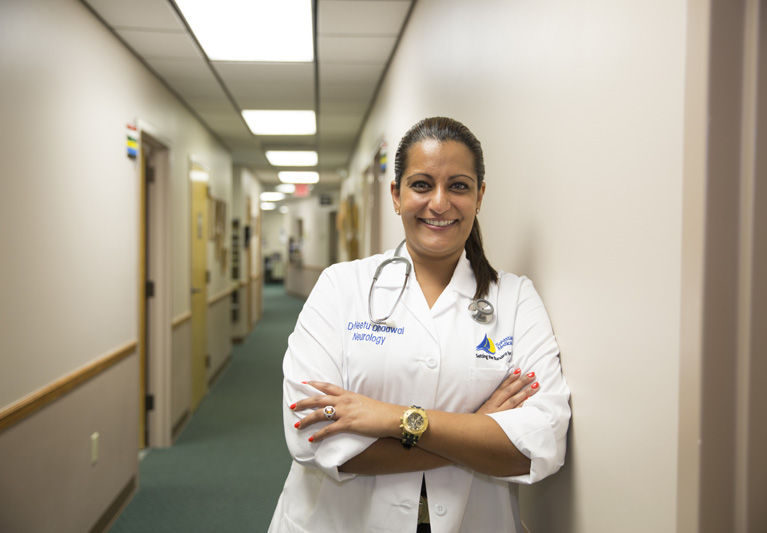
What scares today’s senior citizens more than cancer, stroke, diabetes, heart failure, lung, liver or kidney disease?
According to a poll conducted by the Marist Institute for Public Opinion, the clear answer is memory loss in general and Alzheimer’s disease in particular.
Dr. Neetu Dhadwal (pronounced dad-wall) is a board-certified neurologist who served as chief resident at the New York College of Medicine before going on to Manhattan’s famed Mt. Sinai hospital for a clinical neurophysiology fellowship.
“Memory loss is (like) a four-letter word for many people,” she says.
That shouldn’t come as a surprise. Well over 5 million Americans suffer from Alzheimer’s and 500,000 of them are Florida residents. More to the point, there is currently no cure for that dreaded disease.
Over 60 percent of the U.S. population has had at least some personal experience with friends or loved ones afflicted with Alzheimer’s and that makes the devastating effects of that extreme form of memory loss painfully obvious to most Americans.
Dhadwal, however, quickly points out that, “Not everybody with memory loss has Alzheimer’s dementia.”
The authors at Merck Manuals, the world’s best-selling medical textbook, agree. “Most memory loss,” says the highly respected source, “does not represent the onset of dementia,” let alone Alzheimer’s disease.
One of the “bread and butter” jobs of a neurologist, Dhadwal says, is to find out if a patient’s memory problems are potentially reversible. Depression, vitamin B-12 deficiencies, thyroid disorders and infections, Dhadwal claims, can all lead to memory problems that can be reversed.
WebMD adds that, “A number of prescription and over-the-counter medications can interfere with or cause loss of memory.” Included on that list are antidepressants, antihistamines, anti-anxiety medications, muscle relaxants, tranquilizers, sleeping pills and certain pain medications.
Excessive alcohol use, smoking and getting too little sleep can also contribute to reversible memory problems.
“There’s a big misunderstanding,” Dhadwal emphatically states, “that memory loss is normal for aging. Memory loss is not actually a normal part of aging.”
“You know,” Dhadwal explains, “we all can be forgetful. Your attention and concentration can be affected at any stage in life and it usually has to do with environmental triggers.”
That said, as with any issue related to the workings of the human brain, memory loss can be a complex and sometimes confusing topic to tackle.
While some forms of memory loss may be reversible, others are not.
That’s important. The first signs of irreversible memory loss and dementias – including vascular dementia, Frontotemporal dementia, Lewy body dementia and Alzheimer’s – can be strikingly similar to those of the reversible forms of memory loss.
“Dementia,” says the Mayo Clinic, “is an umbrella term. It is used to describe a set of symptoms, including impairment in memory, reasoning, judgment, language and other thinking skills. Dementia begins gradually in most cases, worsens over time and significantly impairs a person’s abilities in work, social interactions and relationships.”
While neurologists like Dhadwal may treat other disorders such as seizures, multiple sclerosis and Parkinson’s disease, they are also the ones best-trained to accurately diagnose, treat and manage both reversible memory loss and dementia cases.
“Treatments,” according to Dhadwal, “do not cure dementia but we can slow down its progression and we can improve quality of life and make sure our patients with severe dementia have services in place, caregivers, social services (and) day programs.”
The good news? Simply forgetting where you left your car keys is no reason to panic.
However, if you start leaving those same car keys in the refrigerator or other places you’d never left them before, it might be wise to at least speak with your primary care physician or to a neurologist.
Dealing with the possible onset of any type of dementia is a daunting and downright scary task, but getting an early diagnosis can help.
Modern diagnostic tools such as CT, MRI and PET scans, transcranial Doppler scans, electroencephalograms and electromyograms can provide neurologists valuable clues about the best form of treatment for each individual.
Whether that’s through medication, exercise regimes or other treatments, the affable Dhadwal sums up her memory loss mission by simply saying, “I hope to help.”
Dr. Neetu Dhadwal is with Riverside Neurology at 13855 U.S. Hwy. 1, Suite 4 in Sebastian. The phone number is 772-581-8247.



